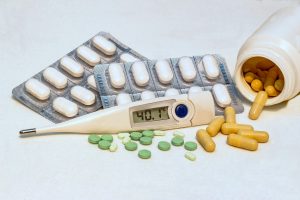When people who suffer from severe pain, opiates are prescribed to relieve them. But reportedly, more than 12 million people in the United States use prescription painkillers for non-medical use back in 2010. These prescription painkillers include oxycodone, hydromorphone, and hydrocodone, and others. These medications need a prescription for the purpose that these can be addictive. If a person uses opiates and stops suddenly, they can develop opiate withdrawal. As a result, many people continue using it just to prevent the horrifying symptoms of opiate withdrawal. Because withdrawal can be unpleasant, many people opt to look for other ways to relieve their symptoms. There are non-pharmacological ways to alleviate pain like getting extra rest, doing diversional activities, and massages. Other people dive into home remedies and herbal treatments to dodge opiate withdrawal.
What are the symptoms of opiate withdrawal?
Fever and Sweating
Opiate withdrawal can cause symptoms similar to the flu. Flu-like symptoms include fever, sweating, body malaise, and chills. Common treatments include intake of over-the-counter medications, such as ibuprofen and paracetamol. You can try tepid sponge bath and increase consumption of water can relieve flu-like symptoms.
Shaking
Intake of opiates can make the muscles feel heavy. Since withdrawal symptoms are the opposite of you what you feel with the consumption of opioids, you may feel shaking and experience muscle pain. These tremors can subside over time.
Nausea and Diarrhea
Nausea, vomiting, and diarrhea are often experienced by withdrawal from opioids and other drugs. Although this could be a normal reaction to your body, the severity of symptoms may vary from person to person. Replacement of electrolytes and hydration would be the primary goal in the treatment of these symptoms.
Insomnia
While people who use opiates may feel drowsy, they find it challenging to get good quality sleep. It is recommended to establish a sleeping schedule and relaxing bedtime routine.
When to Call a Doctor
Opiate withdrawal can be very frustrating and challenging to manage. It is recommended to see your doctor for the right medical management, especially when symptoms disrupt your activities of daily living. Some medicine can also interact with each other. It’s essential to make your doctor aware of all the medications you take in order to adjust it accordingly. In some cases, blood works are needed to determine the management necessary in your case. If you are worried about your symptoms and think that you can’t go through it alone, you can also seek for support groups like Narcotics Anonymous.


